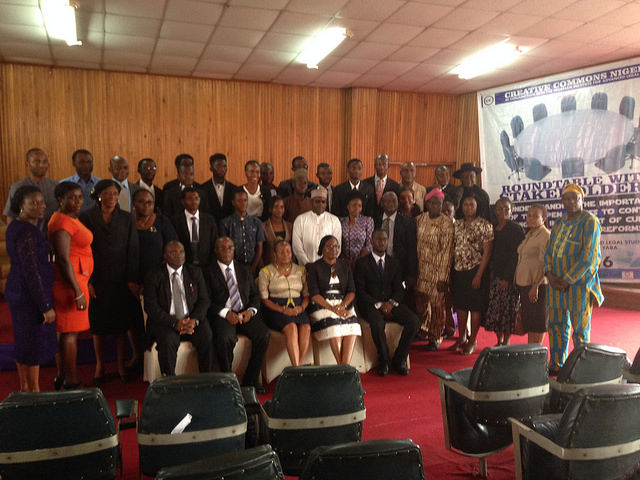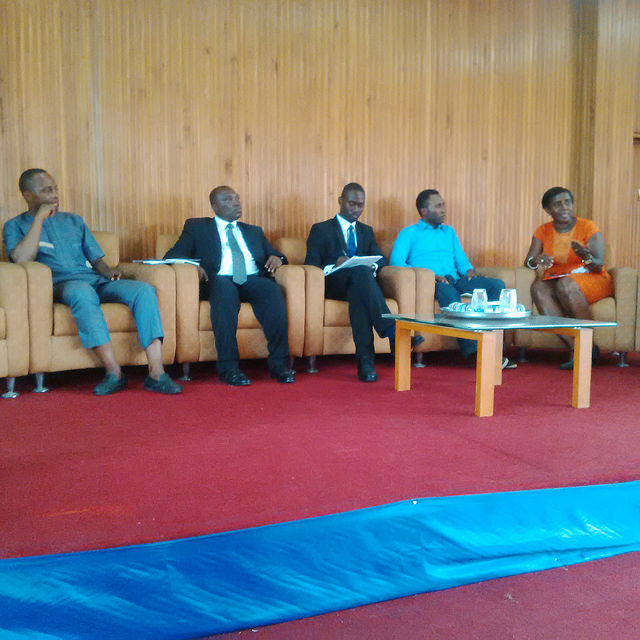Help us protect the commons. Make a tax deductible gift to fund our work. Donate today!

CC Nigeria Stakeholders Meeting. Photo by Kayode Yussuf. CC BY-SA
In the area of knowledge governance today, it is no longer in doubt that ‘open’ is an important and emerging paradigm and philosophy. The shift from strictly closed and proprietary forms of knowledge governance is irrefutable and the notion of exclusive and absolute control over their content by authors is fast becoming the exception rather than the rule. This has resulted in the proliferation of different concepts, models and mechanisms of knowledge governance such as Open Access publishing, Open Education Resources, Open Data. Alongside these are new forms of licensing including Creative Commons, GNU, etc.
Creative Commons Nigeria got support from Creative Commons headquarters through the Awesome Fund and Nigerian Institute of Advanced Legal Studies to host a stakeholders’ roundtable discussion on Creative Commons and its effect on open access to information and knowledge. The theme of the roundtable was “Understanding the Importance of the Open Access to Content in Nigeria in the Light of Current Copyright Law Reforms.”

CC Nigeria Meeting. Photo by Kayode Yussuf. CC BY-SA
Speakers at the roundtable included the representative of the Director General of the Nigerian Institute of Advanced Legal Studies, Prof. Adebambo Adewopo and Ms. Esther Ekong of the Nigerian Institute of Advanced Legal Studies, Mr. Michael Akpan of the Nigerian Copyright Commission, Dr. Ifeoma Oluwasemilore of University of Lagos, Abiodun Thorpe of Rainy Lemon Ltd, Samuel Atiku of BudgIT, Idrees Ibrahim and Kayode Yussuf of Creative Commons Nigeria.
The meeting had 85 participants from various sectors such as government, regulators, academia (high school and universities). The meeting also had librarians, technology start-up companies, social enterprises in attendance. The aim of the meeting was to introduce Creative Commons to the stakeholders and get their feedback. An important part of the meeting was listening to the fears of the community on using Creative Commons licenses.
It was enlightening to note that the Nigerian Copyright Commission, the intellectual property regulator in Nigeria, had plans for Open Access licenses. The regulator had done a lot of research on Creative Commons Licenses and was willing to work with Creative Commons Nigeria in educating the users of these licenses.
There are good reasons for this trend. The concept of open comes with great merits and is in perfect alignment with digital technology as the principal means of knowledge production and dissemination today. The philosophy of ‘open’ in knowledge governance and its merits can be seen in both the public and private sectors in education, research, governance.
For a country in the process of reforming its copyright laws to align with current requirements of the digital age, the concept of ‘open’ cannot be ignored. Unfortunately, it is clear that the philosophy of ‘openness’ in any form of knowledge governance is still a strange phenomenon in Nigeria. The level of awareness and scale of implementation of the different models of openness in knowledge governance in the country are insignificant in proportion to its size, needs and population. Reasons for this include lack of awareness and misconceptions about concepts and models, particularly Creative Commons and Open Access publishing. For instance, despite the increasing recognition of and justification for the use of Creative Commons licenses internationally, the mainstream Nigerian populace in the creative industry regards it with misgivings and suspicion. There is indeed a strong perception of CC among the stakeholders as a threat to their interests as copyright owners. Lack of awareness also exists in the academia and among key policy makers. These concerns clearly underscore the importance and imperative for enlightenment programs on Creative Commons in particular and open access practices and policies in knowledge governance generally in Nigeria. This imperative is further strengthened by the fact that Nigeria is on the threshold of amending her extant copyright statute in response to digital technology. Amending the law without properly integrating the philosophy of ‘open’ and the diverse models in knowledge governance developed on the basis of the philosophy would constitute a serious setback to knowledge governance in Nigeria.
This roundtable was designed to fulfill this need. It provided a platform for CC Nigeria to discuss with provide adequate knowledge of CC to the NCC and other policy makers and stakeholders in the academia and the creative industry as a whole. Such knowledge would be useful in providing them with enough understanding of the objectives of CC and the modalities of the licenses and thus help to clarify existing misconceptions and misgivings over CC.
Next steps after this stakeholders’ roundtable will be to begin to engage each sector. It will be great to host training for librarians, academics, business people and for those in entertainment.
Photos of the event can be seen on Flickr
Posted 04 January 2017